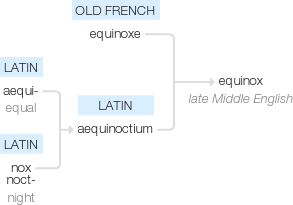Equinox
late Middle English: from Old French equinoxe or Latin aequinoctium, from aequi- ‘equal’ + nox, noct- ‘night’.
wiktionary
From Middle English equinox, equynox, from Old French equinoce (French équinoxe), from Medieval Latin equinoxium, from Latin aequinoctium, from aequus(“equal”) + nox(“night”). Replaced Old English efenniht (Modern English evennight).
etymonline
equinox (n.)
c. 1400, "point at which the sun crosses the earth's equator, making day and night of equal length everywhere," from Old French equinoce (12c.) or directly from Medieval Latin equinoxium "equality of night (and day)," from Latin aequinoctium, usually in plural, dies aequinoctii "the equinoxes," from aequus "equal" (see equal (adj.)) + nox (genitive noctis) "night" (see night). The Old English translation was efnniht. Related: Equinoctial.
